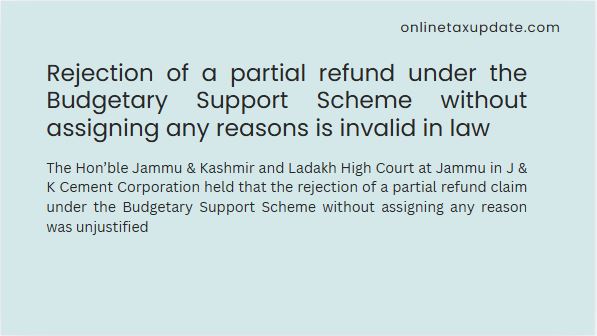Extension of time limits under Section 73(9) vide Notification No. 56/2023 CT – unconstitutional Guwahati High Court
by R.SRIVATSAN, IRS, NACIN, Chennai
The Hon’ble Guwahati High Court has quashed the validity of Notification No. 56/2023, CT, dt:23-12-2023, in the case of Shree Shyam Steel Vs UOI [WP(C)/ 3838/2024] regarding the extension of time for passing orders under Section 73(9) of the CGST Act for the financial years 2018-19 and 2019-20.
The Government, exercising its authority under section 168A of the CGST Act, 2017, in conjunction with IGST Act 2017 has through Notification 56/2023 specifically extend the time limits as outlined below:
For the Financial Year 2018-19:
The deadline to issue orders related to tax recovery for this fiscal year was extended until April 30, 2024.
For the Financial Year 2019-20:
The deadline for orders regarding tax recovery in this fiscal year was extended until August 31, 2024.
This order of the Honourable Guwahati High court has answered several critical issues in terms of statutory interpretation, constitutional principles, and GST governance.
The bench noted that prima facie the notification bearing No. 56/2023 does not align with the provisions of Section 168(A) of the Central GST Act, 2017.
Section 168A, with its non-obstante clause grants the government overriding authority to extend due dates for completing proceedings and taking measures.
But without a proposal/ recommendation from GSTC, the government cannot issue the notification for extending the period u/s 168A of the CGST Act, 2017 and as such, the notification bearing No. 56/2023 on 28.12.2023 is ultra vires without legislative validity.
The notification cannot stand the scrutiny of law because the power to notify u/s 168A is granted exclusively when there is a force majeure.
The Court’s declaration that the notification is ultra vires Section 168A signifies that the Central Government exceeded its powers under this section.
Section 168A was introduced as a special provision to deal with extraordinary situations such as force majeure (e.g., COVID-19) and allows the Government to extend statutory time limits.
However, it must be based on recommendations from the GST Council.
In fact, in the 49th Meeting of the GST Council, the GSTC made a recommendation for extending the time limit for passing the order u/s 73(9) of the CGST Act, 2017 for the
FY 2017-2018 up to 31.12.2023
FY 2018-2019 up to 31.03.2024
and for the
FY 2019-2020 up to 30.06.2024.
According to the recommendation of the GST Council, a notification bearing No. 9/2023-CE was issued dated 31.03.2023 by the Central Board of Indirect Taxes and Customs.
However, GST Council has not made any proposal to date, and despite that, the CBIC has issued a Notification bearing No. 56/2023-CE on 28.12.2023 by extending the period to pass the order Under Section 73(9) of the CGST Act, 2017 for the Financial Year 2018-2019 and for the FY 2019-2020 which has been held unlawful.
The judgment emphasizes that executive decisions cannot supersede statutory requirements, especially in the absence of GST Council’s recommendations.
This ruling is a direct reaffirmation of the importance of the GST Council’s role as a constitutional body that balances federal interests in GST matters.
Section 168A stipulates that any relaxation of timelines must be in consonance with the recommendations of the GST Council.
The judgment thus underscores the principle that executive discretion is not absolute in GST matters and must be subject to the constitutional framework, wherein the GST Council plays a pivotal role in shaping policy.
Well………
This decision will obviously have significant implications for taxpayers who were caught in the disputes under Section 73(9) for the financial years 2018-19 & 2019&20.
The quashing of the notification implies that the statutory limitation periods for passing orders may not stand extended leaving the fate of numerous cases in uncertainty, a potential relief for taxpayers too, as any delay in proceedings beyond the statutory limits could invalidate the actions of tax officers.
This judgment could serve as a precedent/guidance for future litigation surrounding notifications or executive actions that seek to bypass statutory procedures or constitutional mandates under the GST regime.
Share this content:




Post Comment